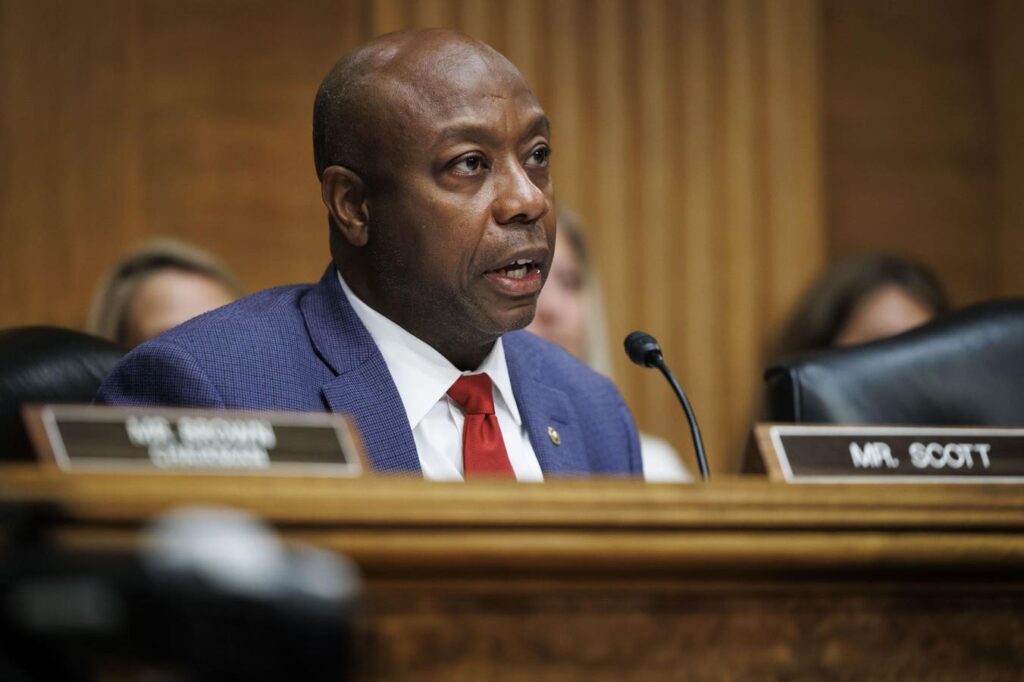Lawmakers are intensifying scrutiny over allegations that U.S. regulators pressured banks to sever ties with certain groups and sectors, primarily cryptocurrency firms, under the Biden administration
The Senate Banking Committee, chaired by Senator Tim Scott (R., S.C.), convened Wednesday to examine claims that federal agencies influenced financial institutions to cut off access to their services. A number of crypto executives said they were unfairly targeted under what many in the industry have labeled “Operation Choke Point 2.0.” The term references a controversial Obama-era initiative that denied banking services for businesses such as firearm dealers and payday lenders.
Among those testifying was Nathan McCauley, CEO of Anchorage Digital, the first and only federally chartered crypto bank. McCauley revealed that Anchorage was rejected by banks nationwide when it sought to establish accounts for corporate funds to be used for day-to-day business operations such as payroll and administrative expenses. He blamed the denials on a series of anti-crypto regulatory actions between 2021 and 2023. The “nail in the coffin that led to the en masse debanking of the crypto industry,” he said, came in January 2023 when the Federal Reserve, Federal Deposit Insurance Corporation (FDIC), and Office of the Comptroller of the Currency (OCC) issued a joint statement warning banks of crypto risks. This guidance, McCauley said, cost them a corporate bank account with one of its partners, forced Anchorage to reduce services and contributed to its 20% layoff.
“We had extreme difficulty finding new bank partners. We spoke to about 40 banks across the country, and were rejected by all of them, many telling us that they had a blanket policy against serving crypto clients,” said McCauley.
While McCauley believes banks themselves were victims of regulatory pressure, Mike Ring, CEO of Old Glory Bank, which launched in response to the problem, accused major banks, including JPMorgan Chase, Bank of America and Citibank, of arbitrarily “picking winners and losers” within the financial system.
The issue first gained widespread prominence in February 2023, when Nic Carter, general partner at Castle Island Ventures, published a report alleging a coordinated effort by federal agencies to marginalize the crypto sector. More recently, venture capitalist Marc Andreessen shared on The Joe Rogan Experience podcast in November that around 30 founders in his firm’s portfolio had been denied banking services. The revelation fueled further outrage in the crypto industry, where leaders saw the debanking trend as part of a broader campaign to stifle the sector’s growth. Similar accounts from the likes of Jesse Powell, cofounder and chairman of crypto exchange Kraken, and Tyler Winklevoss, billionaire cofounder of rival Gemini, followed.
There’s no doubt that events such as the implosion and fraud associated with Sam Bankman-Fried’s crypto exchange FTX in late 2022 and the run on Silicon Valley Bank, which held over $3 billion of Circle’s stablecoin reserves, plus the subsequent shutdown of crypto-friendly Signature Bank in March 2023, were important factors in the regulators’ restrictive approach.
Banks were compelled to weigh the real risks associated with crypto and the so-called reputational risks. Trust, after all, is the cornerstone of banking. However, crypto advocates argue that these “reputational risks” were the key cause of sector-wide debanking because the term is subjective and broadly defined.
It “really has no definition,” said Stephen Gannon, a partner at Davis Wright Tremaine, during his testimony. “It’s something that’s malleable. It can be reinterpreted. It’s at the discretion of the regulators. So what is reputational risk today might be something different tomorrow.”
Senator Cynthia Lummis (R., Wyo.) also presented an excerpt from the Federal Reserve’s Internal Implementation Handbook as “explicit and undeniable proof of Operation Choke Point 2.0.” The excerpt instructs the staff responsible for reviewing applications for account access to evaluate “the conduct of the institution and its leadership” and consider whether any association with the institution might pose “undue reputational risk” to the Reserve Bank. It also raises the question: “Is the institution’s leadership associated with controversial commentary or activities?”
Ahead of the hearing, the FDIC released 175 internal documents detailing its oversight of banks that engaged in, or sought to engage in, crypto-related activities. Previously, the agency released 25 “pause letters” sent to institutions seeking to expand crypto services—an approach that Paul Grewal, Coinbase’s chief legal officer, described as “regulation by exhaustion.” The documents also suggest that some banks were pressured to refuse U.S. dollar deposits from crypto companies, according to Caitlin Long, founder and CEO of Custodia Bank. The timing of the release aligns with the recent appointment of Treasury Secretary Scott Bessent to the FDIC board, though his involvement in the disclosure remains unclear.
The probe continues Thursday as the House Subcommittee on Oversight and Investigations holds a hearing titled “Operation Choke Point 2.0: The Biden Administration’s Efforts to Put Crypto in the Crosshairs.” Scheduled witnesses include Coinbase’s Grewal; Austin Campbell, CEO of digital payment company WSPN USA and an adjunct professor at NYU Stern School of Business; Fred Thiel, CEO of MARA; and Shayna Olesiuk, director of banking policy at Better Markets.
Read the full article here

